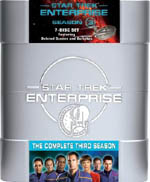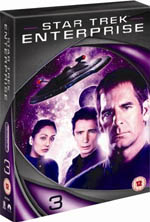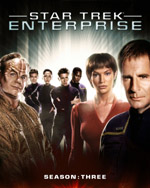60: Twilight
Whoa! What have we here? A time travel story? A mind-bending illusion?
The "disease of the week"?
Whatever it is, you've got to grant that its opening is very attention-grabbing at least.
Something very weird has happened to the command structure on Enterprise, which we will
likely get to discover alongside a bewildered Archer. In fact, this part of the opening
so closely resembles what often happened on Scott Bakula's other famous sci-fi series
Quantum Leap, waking up with an unfamiliar appearance in an unfamiliar time,
that one can say that he's truly earned the nickname Captain Quantum for this
episode. And before we know it, the big bad weapon of the season is upon us,
carrying out its threat in the worst way possible. Whoa!
There's good and bad here with that approach. The bad is that it goes so far
that we can instinctively guess, based on Star Trek's past record with such subjects
and our knowledge of future eras, that this is a narrative that won't count due to
being erased and re-written, or whatever. Should we bother investing our emotions
in this one? Well, we're still urgently wanting to know what IS really going on,
so technically, the episode hasn't blown it yet.
The good comes from the rarity of Star Trek
doing one of these time-benders within a big season-long story arc. Most of what we
witness during this story, even though false, still works to make real to the audience
what the stakes are should our characters fail in their main mission. And the episode
takes time to visualize those consequences with considerable detail, both with grand
wide shots and opticals, and also with a twisted evolution of the Human attitude towards
aliens and the galaxy at large as evidenced with Trip and Reed's new standards
of interaction. There's in-joke irony as well in the fact that Humanity has
taken refuge on a planet called Ceti Alpha 5 - audiences familiar with Kirk's exploits
can guess what astronomical fate awaits them there. Thankfully, there's a bit more colour
than usual in some of the visuals we get today, especially at the beginning, and the
abrupt change in tone is arresting. Not bad. Many of the good points I will give to this
episode come from the opening half where most of this rich material is explored.
But on reflection, the episode's handling of its temporal aspects just begs for an anthology series
to accommodate the episode. The setup of today's problem is perfect and complete in handling time, and
represents a profound thought by the writers - Extra-dimensional parasites preventing Archer from forming
new memories, so he feels like he's skipping over years when in fact he's lived through every day
and can't remember. I've said it before for a lot of
Steven Moffat's Doctor Who stories: there's much more wiggle-room
and interesting story possibility in the manipulation of memory than in the manipulation of time.
But of course, Enterprise doesn't have the anthology format that Brannon Braga seems to be so
instinctively well-suited for. Writer Mike Sussman has to go on to attempt to solve
today's problems to continue the flow
of an ongoing series with an ongoing narrative, and here the writing stumbles and fumbles,
falling back on
the old unconvincing crutch: the magic reset-button.
Nitpickers may well wonder how Phlox's treatment erases the parasites from their past existence,
but doesn't erase his or T'Pol's memories of them. Once again, Trek's handling of time
bumbles into the territory of alternate universes and sliding, but tries to explain it
and have its reality dictated by dumb old single-line-rewrite temporal theory.
I'm very uncomfortable with it, and unable to buy into the way that the characters witness
the eradication of the parasites or their extrapolation of a plan to "change" their present
with temporal magic.
As soon as Phlox hints at this all-too-common Trek standard,
you may as well roll the credits already, because we've removed our emotional investment from
all the considerable action that ensues. Normally, I'd love all that action with CGI optical
shots of the ships, corridor skirmishes, lasers everywhere. But we no longer care if
Enterprise's bridge blows up, or Ambassador Sevol or any of the regulars buy the farm,
because we know it can't count for diddly
squat. Next week, it'll be as if none of this has happened, and none of the characters will remember
it either. We know they won't care. We already don't care. This is NOT the way to do action.
On that note, perhaps this is a good time to bring up the subject of Travis Mayweather,
and the actor's missing-in-action status. I remember that at about this point in the initial
run, a friend of mine who was a much more avid follower of this series than I was, told me that
Travis was her favourite character among the regulars. I shrugged my shoulders, having not
seen him take center-stage in any story other than "Fortunate Son". I began to look forward to
another story focused on him, to assess whether or not he was truly the best of these characters.
Instead, he barely got a line or two in each episode, and was often seen on the bridge without
getting anything to say. "Twilight" is a story that really wants to show a possible future
for all the series regulars, much like
"All Good Things", or
"The Visitor", or
"Endgame".
Instead, Mayweather is killed off really early in this one, and an extra replaces him at his
post. I'm not sure I know what the story was behind this "regular" castmember who barely shows
up from now on, but you'd think they'd just kill him off or reassign him permanently rather
than continue having him make half-hearted appearances. Really weird.
The episode's time-memory problem-set-up worked well at defining the stakes for the season,
an unexpected bonus for a Trek
time-travel story which is unique for the season that "Twilight" finds itself to be a part of.
The anomaly that caused all this can also be dealt with short-hand, since there's been plenty
of exposition and exploration of it in stories like
"The Expanse",
"The Xindi",
"Anomaly",
and "Exile", all of which makes the premise easier to buy into.
A saving grace for "Twilight" is that its catalyst event of Archer saving T'Pol from
an anomaly in the corridor is a solid event that OUR regular characters can take with them.
If the false future is any indication, it is a profound moment from T'Pol's point of view,
which should continue to have some impact on their relationship on the series.
We also have to note that there isn't any actual time travel here, except perhaps by
the episode's cameras. The bulk of the episode sees the cameras skipping forward quickly,
making the audience experience the gaps in Archer's memory with him. But having slid
to an alternate universe at the end, we want to see everything play out here and follow the
cause from one future to the effect in a "new" past, so we start
back at the diverging point, and since Archer will be able to remember everything normally
again, we're back to our usual speed of spending about two dozen episodes for each unfolding year
in the Trek universe. Very weird.
In the end, I've got very mixed feelings about this one. There's a lot of good material
here, and some profound moments and ideas and stake-raising/clarifying. But Star Trek is still
tripping over its misconceptions about time, trying to invest emotions in the wrong places.
Had they matured in those areas, this story could have gone up a good many notches. It remains
to be seen whether it actually added anything relevant to the season's arc, or if that arc
flows better without the distraction of this episode's detour.
Read the next In-depth Analysis Review:
"Carpenter Street"
|
|








 slimline
slimline



